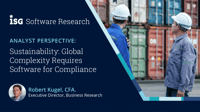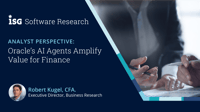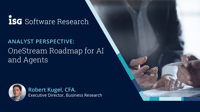ISG Software Research is expanding our ISG Buyers Guide™ coverage to include the topic of sustainability. Our buyers guide will focus on sustainability exclusively rather than the full spectrum of environmental, social and governance topics. One reason is that gathering, managing, analyzing and reporting environmental data under the various frameworks and statutes presents enterprises with considerably greater challenges than the other two. For most, it is likely the least well defined and the...
Read More
Topics:
Office of Finance,
Operations & Supply Chain,
ERP and Continuous Accounting,
supply chain management,
digital finance,
Sustainability Management,
Business & Technologies
Sage recently held its Future user conference in Atlanta. Our ISG Buyers Guide for Midsize ERP Financial Management (2024) rated Sage Intacct as one of the top three providers, reflecting its strong performance in both product capabilities and customer experience. The event showcased its advances and roadmap aimed at embedding artificial intelligence (AI), generative AI (GenAI) and agentic AI in its applications, especially ERP. In 2024, nearly every software provider highlighted its (mostly...
Read More
Topics:
Office of Finance,
ERP and Continuous Accounting,
digital finance,
Procure-to-Pay,
Order-to-Cash,
Business & Technologies
Oracle’s recent industry analyst summit demonstrated significant progress in embedding artificial intelligence in its business applications—including those for finance, HR and supply chain management. This amplifies the already broad and deep functionality developed over decades. Oracle also continues to expand and extend its collaborative efforts with financial institutions, a form of network-enabled extended process facilitation that I expect will grow in importance for business software...
Read More
Topics:
Office of Finance,
ERP and Continuous Accounting,
digital finance,
Procure-to-Pay,
Consolidate and Close Management,
Order-to-Cash
OneStream offers a platform designed to serve the needs of accounting and financial planning and analysis (FP&A) organizations. The software handles financial close and consolidation, planning and budgeting, analysis and reporting.
Read More
Topics:
Office of Finance,
Analytics,
Business Planning,
ERP and Continuous Accounting,
digital finance,
Generative AI,
Consolidate and Close Management,
AI and Machine Learning
The six costliest words in managing a finance department are, “We’ve always done it this way.” The record-to-report (R2R) cycle describes the process of finalizing and summarizing the financial activities of a business for a specific accounting period—typically a month, quarter or fiscal year. It is important to note that R2R exclusively covers the activities between recording (keeping the books) and reporting (publishing financial statements and management accounts). It involves completing...
Read More
Topics:
Office of Finance,
ERP and Continuous Accounting,
digital finance,
Generative AI,
Consolidate and Close Management,
AI and Machine Learning
We live in a time of uncertainty, not unpredictability. Especially when a business finds itself on an undefined journey with an unclear destination—whether caused by internal events or the world at large—having plans to deal with a range of outcomes increases the odds of success. Or, at least enduring the least amount of damage. Managing an organization in uncertain times is always hard, but tools are available to improve the odds of success by making it easier and faster to plan for...
Read More
Topics:
Machine Learning,
Office of Finance,
Supply Chain Planning,
Business Planning,
Supply Chain,
Enterprise Resource Planning,
Artificial intelligence,
digital finance,
Generative AI
Infor provides industry-specific enterprise software that enhances business performance and operational efficiency. These verticals and related micro-verticals include manufacturing, food and beverage, hospitality, healthcare, distribution and retail. Infor offers applications for enterprise resource planning, supply chain management, customer relationship management and human capital management, among others. Infor’s strategy is to tailor software with a high percentage of specific...
Read More
Topics:
ERP,
Machine Learning,
Office of Finance,
Operations,
Continuous Accounting,
Supply Chain,
AI
Managing corporate income taxes is a challenge for chief financial officers and their tax department professionals. Tax codes are often complex, so tax accounting as well as the data required for tax provisions and tax compliance are different enough from statutory accounting to create significant workloads for the tax department. The provision for income tax expense and, for public companies, the assembly of information related to tax-related disclosures, can be a factor holding up the...
Read More
Topics:
Office of Finance,
Tax,
ERP and Continuous Accounting,
tax; tax provision; transfer pricing,
digital finance,
Consolidate and Close Management
ISG Research recently announced the results of its Business Planning Buyers Guide for 2025. We rated Board Exemplary and a leader in customer experience and in reliability. Board recently launched two external data offerings that significantly strengthen the capabilities of its planning software. Its Board Foresight is designed to support more effective and potentially more accurate forecasting using predictive models harnessing artificial intelligence (AI). Board Signals makes third-party...
Read More
Topics:
Office of Finance,
Business Planning,
digital finance,
Consolidate and Close Management
Agents and “agentic AI” are all the rage now, eclipsing last year’s focus on artificial intelligence (AI) and generative AI (GenAI). They are a way to automate work almost effortlessly so that repetitive and boring tasks get done with the least amount of effort and perhaps, more consistently. In business software, a broad range of software providers are claiming agents to be a panacea that can improve performance and lower costs. They are alluring, with an almost unlimited number of potential...
Read More
Topics:
Office of Finance,
Digital Business,
AgenticAI




















